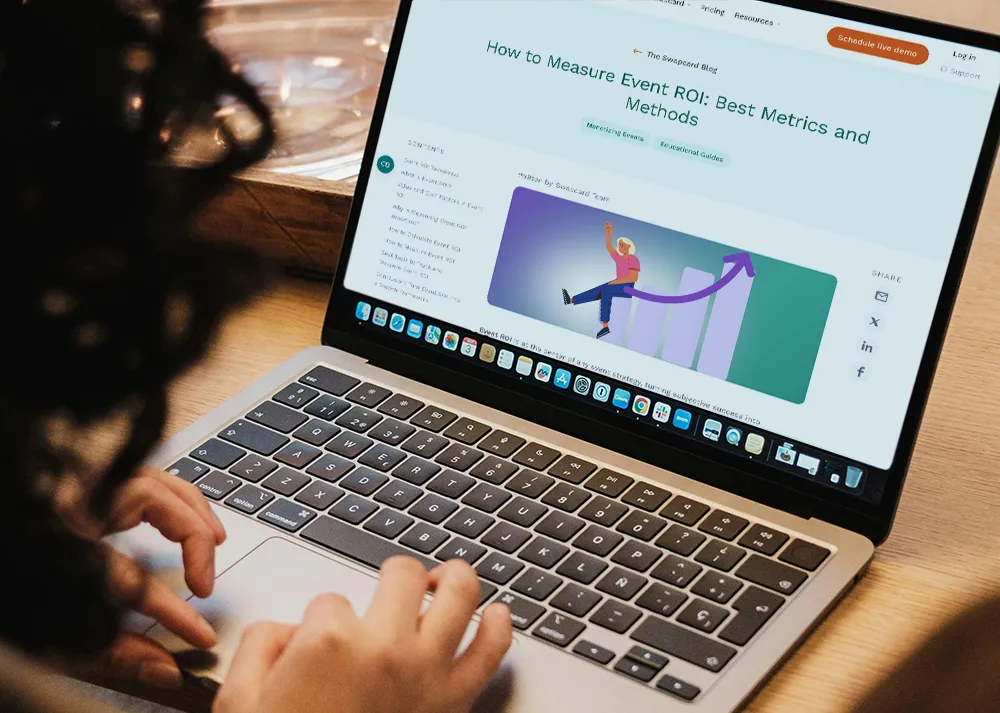PCMA Convening EMEA 2025: Designing Events for a More Connected Future
The PCMA Convening EMEA 2025 in Rotterdam gathered over 650 business event professionals from 46 countries for an energizing few days of learning, creativity, and collaboration. Hosted inside the historic Rotterdam Grain Exchange, a symbol of resilience and reinvention, the event reflected the city’s innovative spirit and the industry’s drive to reconnect and reimagine experiences.
As the official event tech partner, Swapcard powered PCMA+, the event app that kept attendees informed, connected, and inspired throughout the conference. But beyond digital engagement, the event embodied something more profound: a renewed sense of human connection at a time when the industry and the world need it most.
.png)
The Era of Connection: Why human moments matter more than ever
The central theme running through Convening EMEA 2025 was clear: connection is the new currency. In a world where technology facilitates every interaction, creating meaningful human engagement has become both rarer and more valuable.
Economist and author Noreena Hertz set the tone in her opening keynote, “The Great Disconnect.” She unpacked the paradox of our times: constant digital contact paired with growing emotional isolation. Her message was a call to action for event professionals to design experiences that make people feel smarter, calmer, and more connected in uncertain times.
This “escape economy,” as Hertz described it, is shaping how people engage with content and events alike. Attendees increasingly seek moments that deliver calm and care, through design, storytelling, or shared ritual. Convening EMEA embraced this trend, blending intellectual depth with experiential creativity: yoga sessions, community open mics, and even a coffee bar teaching sign language, turning small details into memorable moments of inclusion.
.png)
Small touch, big impact
One of the most powerful lessons for organizers was how small, intentional design choices can create big emotional impact. Across sessions and activations, inclusivity wasn’t treated as an afterthought; it was woven into the event fabric.
A standout case study came from Joanna Roodt, Head of Engagement, Communications and Events & Conference Project Manager at EARMA, who shared how her team uses creative micro-engagements to strengthen community at their own events. From open-mic corners and skill-based meetups to “networking cups” and flexible meeting spaces, her examples showed how simple ideas can turn attendees into participants. Joanna also highlighted the role of an event app in helping people connect with who they most wanted to meet, proving that when thoughtfully integrated, technology can make human interaction more intentional and meaningful.
These insights reinforced a key message: you don’t need a big budget to build a connection; you need intentional design.
Technology with purpose, not noise
Artificial Intelligence dominated conversations this year, but not with uncritical enthusiasm. Across sessions, speakers echoed a shared perspective: AI is transforming the event landscape, but the winners will be those who use it strategically, safely, and with empathy.
Discussions explored how AI can enhance event planning, curation, and engagement with personalized agendas, smarter matchmaking, and predictive insights, while also warning against over-automation and loss of authenticity. As keynote speaker Noreena Hertz emphasized, “AI should complement human creativity, not replace it.
That philosophy mirrors the shift happening industry-wide: event technology is no longer about having the most features; it’s about helping organizers focus on what matters most: people. Swapcard’s role as the connective layer between systems, data, and attendees underscored that vision throughout PCMA+’s adoption at the event.
.png)
Redefining ROI: From Return on Investment to Return on Intention
A recurring theme across panels was the evolving definition of ROI. Rather than focusing solely on metrics, organizers are now measuring the quality of engagement and the depth of connection. The conversations revealed a growing appetite for tools that translate human interactions into actionable insights, helping stakeholders understand not just who attended, but why they connected.
This marks a cultural shift in the business events ecosystem: collaboration across organizers, venues, and technology partners is essential.As highlighted in the “Beyond Collaboration: Deconstruct Strategic Partnerships” session, “No one delivers results alone.” Shared goals, data alignment, and embedded tools will define the next generation of successful events.
Closing with purpose and possibility
The event closed with a reminder of why this community exists: to create meaningful experiences that move people. PCMA’s CEO Sheriff Karamat urged attendees to embrace unity, inclusivity, and sustainability in an era of “polycrisis.” His message, “Together is a verb” captured the collective energy of Rotterdam and the renewed optimism of the business events industry.
Convening EMEA 2025 wasn’t just about ideas; it was about action. It showed that when technology and humanity work together, events can be engines for connection, empathy, and progress.
About PCMA EMEA
PCMA (Professional Convention Management Association) is the world’s leading business events community, known for driving innovation through education, advocacy, and global networking. The Convening EMEA series brings together leaders from across Europe, the Middle East, and Africa to explore the future of event strategy. The 2025 edition took place in Rotterdam, with Lisbon announced as the host city for 2026.
Join 12,000 subscribers and unlock industry secrets.
By submitting this form, you agree to receive periodic emails on insightful content related to events and our product, and in accordance with our Privacy Policy. You can, of course, change your preferences or unsubscribe at any time.





.png)

.svg)


.svg)
.svg)
.svg)





